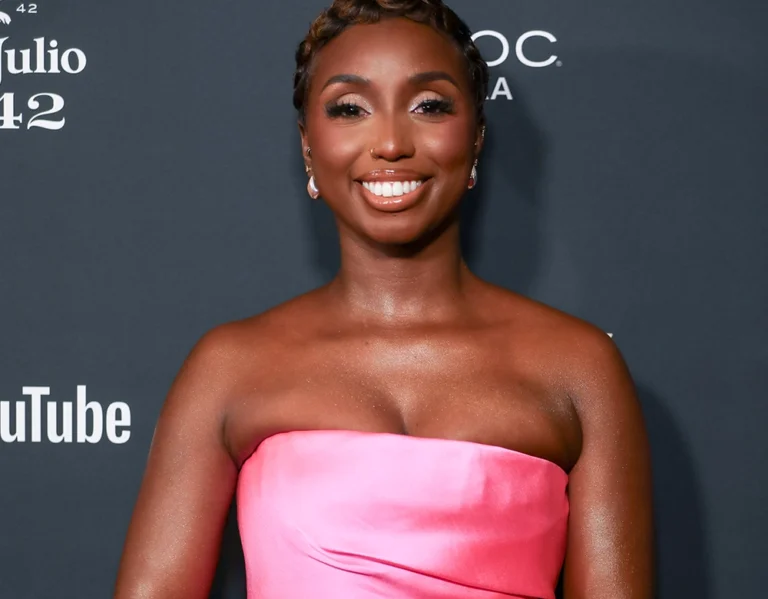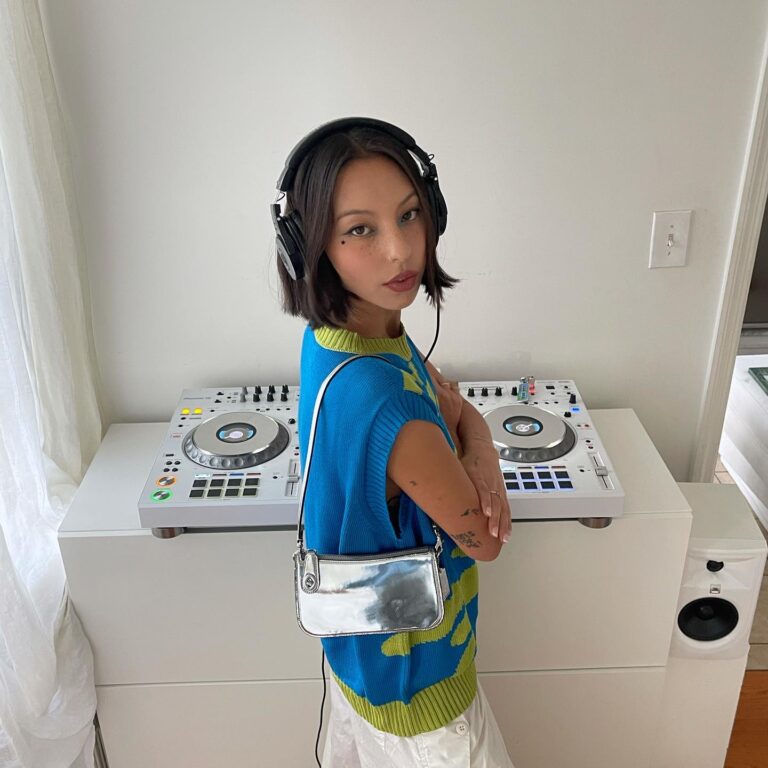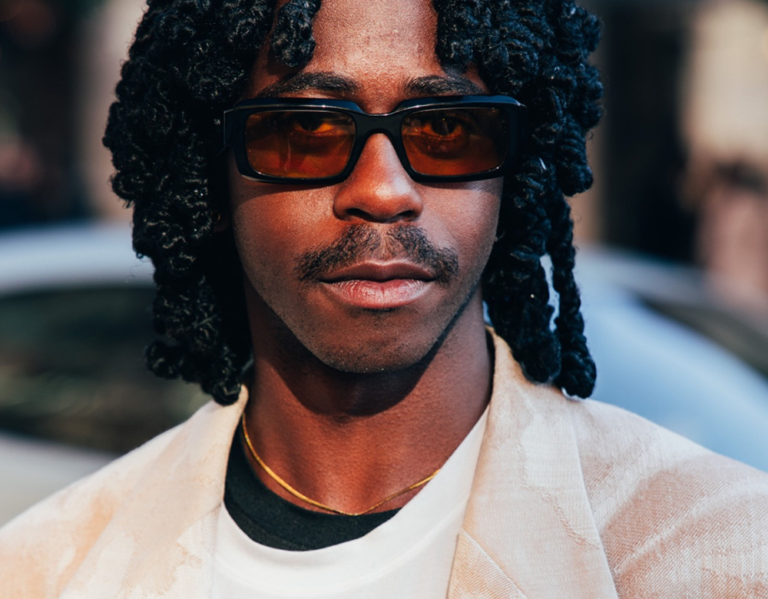Tommy Gold, DJ & Producer, London

Hey Tommy, do you want to introduce yourself?
I’m Tommy. I’m 25-years-old. London born and bred.
Can you tell us what your job title is, or explain what you do?
My trade is a DJ, and it’s really about communication via music. That’s how I see it.
Do you have a day-to-day routine? I’m assuming you travel a lot and things are constantly changing.
Normally, if I’m in London, my routine is to do some form of exercise and stretching in the morning and then go to the studio in the daytime, when I have sessions with people. If it’s a busy week I’ll have maybe three or four gigs in the evenings. My time is pretty much split between studio, clubs and travelling.
I have a lot of friends who are DJs. It’s always interesting to me to know how do you find a balance between staying healthy and being “on job” and then also playing crazy times and being in clubs or whatever. Is there a balance?
I try my best. Your circadian rhythm gets so fucked up from doing this sort of stuff, because you’re sleeping pattern is all over the place and you’re changing time zones all the time. It sounds a bit ridiculous, but I’ve really realised the power of sleep. I used to force myself to sleep less to go to the gym or whatever but I realised that my actual health stayed much better if I just made sure, even if I go to bed at 6am, to try to get eight hours sleep. With being a DJ, I feel like it’s actually the social element that can really take a toll. I find my recovery, especially mentally, is mainly solitude.
How did you get to this place in your career? When did you think “I’m really interested in being a DJ”?
I always thought I would do something with music because I grew up playing guitar. When I was 14, I met these guys who were playing in a ska punk band. It’s hilarious… No one knows about this. I used to play with this band, we were awful. We would do ska covers on YouTube and go to gigs at the Camden Underworld. That was sort of the first scene in music I was introduced to. Then I started a new band. We did more indie stuff and I was trying to sing. It was also awful. But it was a great experience because that was the point when I realised, I love music but I also love collaboration, I want to work with people.
I have a brother who is nine years older than me and he was big into NTS radio. This was maybe the fourth year of NTS, So it wasn’t as big as it is today. I was always into variety, and my brother showed me this platform where I could discover new music. So I reached out to NTS. I just sent them an email explaining my situation, that I was about to turn 17 and that I was just super interested in the NTS sphere and what they had going on. I actually reread it recently. I said something like, “I love music, I love to travel, I’m not really happy with the surroundings of my life at the moment and I’m trying to connect with new people.” And then Femi [Adeyemi, NTS Founder] responded! I went there the next day and he took me for a walk around Dalston and said that the way I wrote my email was very NTS. He was like, Whenever you have free time just come into the office, be around everyone. Whenever I had time off school I would go there. I started taking the booth photos and I met all the DJs. Femi was really pushing me to learn what I wanted, and taught me how to download a USB and let me come and use the studio to practise. For me then, success was just to get a regular show on NTS. They did a show at Cameo in Shoreditch, and they let me close. After the headline performances finished, the whole crowd just disappeared. I didn’t even know how to DJ at that point. I was just playing rubbish. But all my friends came, my sister, and it was very clear to me, Alright, cool, this is what I’m gonna do. After that live show I thought I would be more of a radio DJ. Then Femi let me do a guest mix and I’d do that occasionally, or specialist ones.

Wow, so all the experience was really relevant.
I was doing guest mixes and getting a bit better. I was also building relationships with all kinds. That was sort of like my university. I was actually still at school and I was coming up to college. I wanted to start making money. NTS offered me a role coming in three days a week, to work for them and keep learning from other people, but I was also meant to be doing my A-levels. I was super fortunate that my dad was always really pushing the music and really understood that there was something there. He actually came into my sixth form with me and made a deal with the school that I was allowed to take time off. This is the period when NTS LA was launching and I asked Femi, “Can I come with you?” I took maybe a month off school, which was ridiculous. I was meant to study when I was there but obviously I didn’t.
That was that LA trip that made me think, When I get back to London, I’m gonna go so hard with the DJ thing. I already knew I wanted to do that but I didn’t realise what was possible. Seeing people like Steven Julien play out there I was like, Oh shit, you can travel doing this stuff. I was making all these new relationships, meeting all these people I was a fan of. I started practising so much. That’s all I wanted to do. I came back to London. I fell into working with the Bone Soda guys, through Femi introducing me. I got offered my own NTS show but at the same time the Bone Soda guys asked me if I wanted to run their show. I decided to do Bone Soda, because it was already established and had listeners, and I was still young, I still had time to do my own thing. I was running their NTS show and producing music and finding what my lane was and what sort of genres I wanted to be playing. That was really how I met everyone I do stuff with now. I did that for a while. I left maybe two or three years ago and since then I’ve been focused on my own music. I’m really grateful that I took my time with releasing my own music. I have so much unreleased stuff and I’m the most confident in my product that I’ve ever been. But, yeah, it all comes from NTS really. I wouldn’t really have any of this without Femi. He helped me a lot and opened my eyes to things that I would never really be exposed to at a young age.
"I know that I trust my taste enough that I can be around people who have more technical ability than me or more knowledge and I can hold the conversation just out of my curiosity."
Also the fact that you just emailed them and reached out. You really tapped into the community around you and took those physical opportunities, and then were able to give yourself space and learn from the people around you.
I realised from a very young age that I learn best from conversation and from being around people that are better than me. The only way to really grow is if you’re around people that inspire you and that you can learn from. My whole thing is like ‘feel’ and ‘ear’. I did play guitar but I’m not classically trained. I know that I trust my taste enough that I can be around people who have more technical ability than me or more knowledge and I can hold the conversation just out of my curiosity. It’s about putting your ego to the side. I had to relearn that a bit the past few years because I got comfortable, but that’s how I started. If you don’t ask, you don’t get, so you have to put yourself out there. People are really willing to help if you come to it being curious, without your ego.
What does someone need to start DJing? Is there equipment? I know you said you went to the studio a lot.
The typical equipment we have in clubs in the Pioneer CDJ and some kind of mixer, and that equipment is super expensive. If you’re beginning then that’s a crazy investment, especially if you’re not sure if it’s something you’re definitely going to do. You can get a more condensed version of things, which are great because you can just get the basic premise. There’s also things like Pirate Studios, which is really accessible for young people to use and practice. I would load up a USB, book a room at Pirate Studios, just try to figure it out for yourself. Watch people play, watch YouTube videos. It’s not something you need training for, you just need to know the basics and then keep watching what people do and learning.
It’s not nerdy to read the manual. I think something that’s always set me apart is that I actually put in the hours of learning the equipment, understanding the sound, how the equipment works, how it’s going from the deck through the PA system. It gives you more freedom if you actually understand how the equipment works. My advice would be to really learn the equipment, actually understand the energy running through the systems. A real DJ can play on anything. Now, because there’s so many DJs, you really have to set yourself apart to find your own style and the only way you can find your own style is if you really know the equipment you’re using.

In this oversaturated age, do you think there’s a way to stay relevant in DJing? Or do you think it’s more a case of if you do what’s good it’s going to stand the test of time, and people are going to come back?
There’s many ways of doing it. It really depends on the person and what their strengths are as a DJ. You can focus on radio and shows, be a broadcaster and a tastemaker. I do think it’s very difficult to get to a certain level of being a DJ without having your own original music. Because the scene is so oversaturated now, the way to set yourself apart is to have music that’s your own. Anyone can play it, but obviously it’s gonna be more important to go and see the person who has actually made it. And building your community. Then someone’s going to think, Oh, I’m gonna go see this DJ play because he has this label and he might have unreleased stuff from these people. Make sure you have a community around you of people that are like-minded and have a similar sort of sound. I would always advise people to either have a radio show where you have something unique about you or, if you’re not going to make your own music, you have to dig into finding records that no one else has. Then when people come to see you they’re gonna come and hear something they’re not gonna hear anywhere else.
You’ve started your own label, Fajita Disco, right?
We started with our own party a few years ago at China Chalet in New York. We didn’t have a plan, it was more out of boredom. Then my partner Hank Korsan and I realised we should use it as a vehicle. We have so many people that we love around us making music so let’s create this little platform for our people, and we can put out our own music that might not have a home anywhere else. I’m also launching a new party called Sugar Rush. Throwing parties is really important to me. It’s also a great way to build your own brand and show people what you’re all about.
I wanted to ask about the EP you just released. How do you collaborate with another musician? What is your creative process like?
It really varies. For this project, Joshua Coniglio is someone I know through Fajita Disco. He sent us music and we just loved it. He’s based in London and I bumped into him and we just connected on a personal level. For me, you have to connect with the person, human to human, otherwise I can’t really create with them to my best ability. And we just struck up a very quick friendship. I always just have sessions with people, but I don’t expect much from them. I’m just going in to see what could happen. It happened super seamlessly. I feel like that comes from having a genuine relationship with the person you’re collaborating with. You know?
"If you don’t ask, you don’t get, so you have to put yourself out there."
What do you enjoy most about what you do?
The number one thing that I love the most is how I get to share people’s best times. I come from loving club culture and being in the crowd. I still am that guy and I still go out all the time because I love the experience. My favourite thing is that I get to sort of create those experiences for people and maybe inspire them to do it as well. The best DJs understand community and it’s about creating a communal feeling for people. Music is transcendental really. There’s nothing more powerful than a room of people feeling the same thing.
The second thing would be getting to travel. I love to travel, even when I’m so tired at the airport and hungover or whatever. I still feel like I’m very much at the beginning of my career and I’m so excited that I still have so many more territories to unlock.
What are the most challenging things about what you do?
I think it takes a very particular type of person to be able to flourish as a touring DJ in general. It’s very overstimulating, socially and in many different ways.
It’s also a really high pressure job. You’re performing.
For sure. I think that’s also why I fell in love with DJing. You have to be okay with fucking up and it all being on you. But I would say the hardest thing is just staying sane through it all, just listening to your body, knowing when to go home. I believe it takes a lot of mental strength and a particular type of person to be able to flourish and do this shit for years. It looks like the most fun thing in the world, but this shit is not easy. To have longevity you need clarity in how to pace yourself, how to make smart decisions, how not to get caught up.
The last question, which is a bit corny, is do you have any words of advice or something you would say to your younger self?
This is a good one, because it’s actually what I would say to my younger self but also what I have to say to myself constantly. I would advise anyone, at any stage of their career, to always just be true to yourself. If you’re trying to please someone else it’s just not gonna work or isn’t going to be authentic. You can’t please everybody, there’s so much music and there’s so many different tastes, so just do what you love. If I’m making music or whatever it is, you want to try and create moments and things that you would want to be a part of, or you’d be a fan of if you came across it. So just be true to yourself. It’s a difficult thing to do, especially in this world where everyone’s just looking at everyone else the whole time. But really just try to make art that you would love, and then hopefully other people will gravitate towards it, and the right people will gravitate towards it. You know, like the people that you want to serve. Make sure what you’re doing is for yourself and not for anyone else.
"Music is transcendental really. There's nothing more powerful than a room of people feeling the same thing."
LATEST THAT MAY INTEREST YOU





